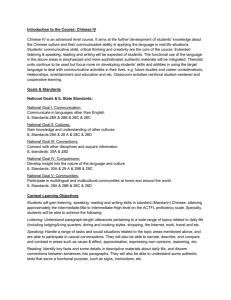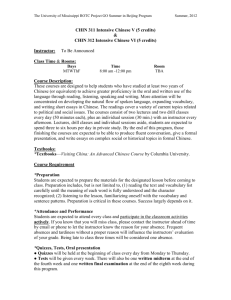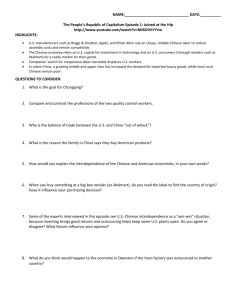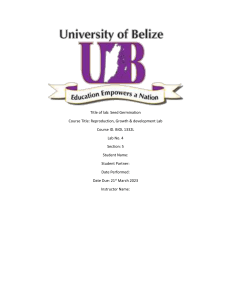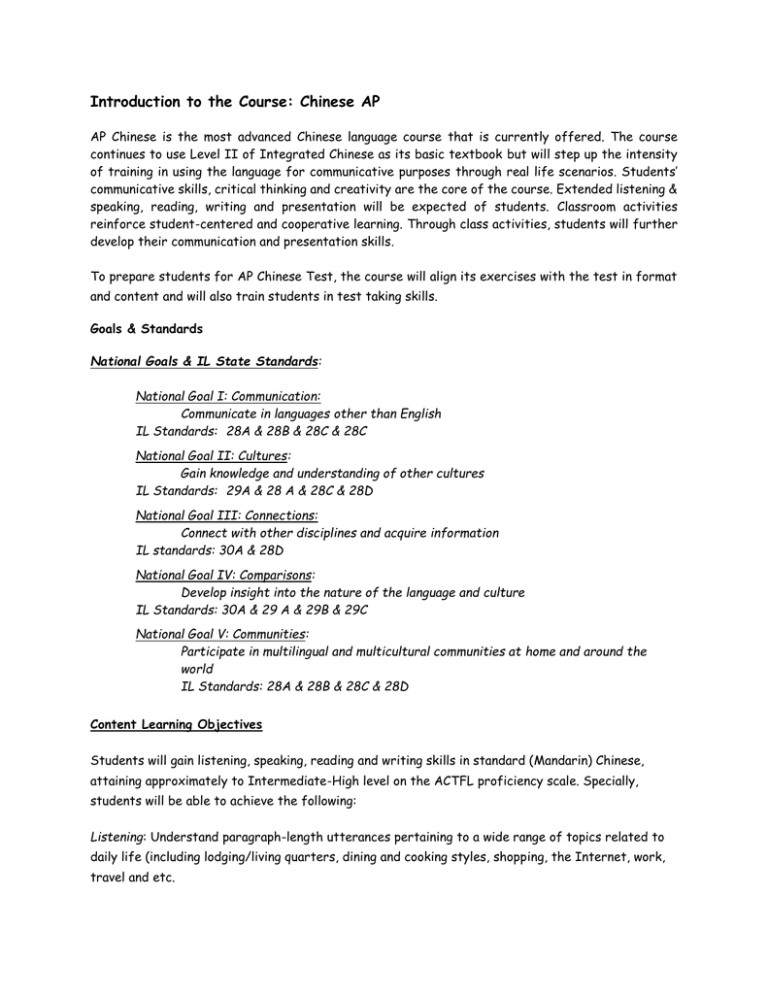
Introduction to the Course: Chinese AP
AP Chinese is the most advanced Chinese language course that is currently offered. The course
continues to use Level II of Integrated Chinese as its basic textbook but will step up the intensity
of training in using the language for communicative purposes through real life scenarios. Students’
communicative skills, critical thinking and creativity are the core of the course. Extended listening &
speaking, reading, writing and presentation will be expected of students. Classroom activities
reinforce student-centered and cooperative learning. Through class activities, students will further
develop their communication and presentation skills.
To prepare students for AP Chinese Test, the course will align its exercises with the test in format
and content and will also train students in test taking skills.
Goals & Standards
National Goals & IL State Standards:
National Goal I: Communication:
Communicate in languages other than English
IL Standards: 28A & 28B & 28C & 28C
National Goal II: Cultures:
Gain knowledge and understanding of other cultures
IL Standards: 29A & 28 A & 28C & 28D
National Goal III: Connections:
Connect with other disciplines and acquire information
IL standards: 30A & 28D
National Goal IV: Comparisons:
Develop insight into the nature of the language and culture
IL Standards: 30A & 29 A & 29B & 29C
National Goal V: Communities:
Participate in multilingual and multicultural communities at home and around the
world
IL Standards: 28A & 28B & 28C & 28D
Content Learning Objectives
Students will gain listening, speaking, reading and writing skills in standard (Mandarin) Chinese,
attaining approximately to Intermediate-High level on the ACTFL proficiency scale. Specially,
students will be able to achieve the following:
Listening: Understand paragraph-length utterances pertaining to a wide range of topics related to
daily life (including lodging/living quarters, dining and cooking styles, shopping, the Internet, work,
travel and etc.
Speaking: Handle a range of tasks and social situations related to the topic areas mentioned above,
and are able to participate in casual conversations. They will also be able to narrate, describe, and
compare and contrast in areas such as cause & effect, approximation, expressing own opinions,
reasoning, etc.
Reading: Identify key facts and some details in descriptive materials about daily life, and discern
connections between sentences into paragraphs. They will also be able to understand some authentic
texts that serve a functional purpose, such as signs, instructions, etc.
Writing: Compare notes and simple letters, summaries of biographical information such as work and
school experience, and other multi-paragraph pieces of writing such as story-telling, etc..
Textbooks & Materials:
1.“Integrated Chinese Level II – Part 1” (Third Edition),Textbook, Workbook and Character Book.
Boston: Cheng & Tsui Company. 2011
2. “Integrated Chinese Level II – Part 2” (Third Edition),Textbook, Workbook and Character Book.
Boston: Cheng & Tsui Company. 2011
3. Audio Recordings for “Integrated Chinese Level II – Part 1 and 2”. Available on CD or as a
downloadable MP3s from www.cheng-tusi.com
4. “Integrated Chinese DVD (Level 1, Part 1 & 2). Boston: Cheng & Tsui Company. 2011. Available
from the Language Lab at Jones College Prep or from www.cheng-tusi.com
5. “Chinese Link”. Pearson Prentice Hall. 2006.
6. “Experiencing Chinese”. Beijing: Higher Education Press. 2009
Required Materials for Class:
- textbook
- a binder for keeping assignments, handouts, quizzes and readings separately in several folders
- a notebook for taking notes in class, keeping instructions for homework, assignments and projects,
etc.
Course Evaluation:
Grades will be cumulative per semester and will be based on the following:
Course Work (homework, oral or written class work, bellringers ) = 15%
Class Participation (various oral communicative activities, interactive or individual/group) = 20%
Assessments (tests and quizzes) = 20%
Projects and Presentations = 15%
Lab Assignments (listening activities, research) = 10%
Final Exam (per semester) = 20%
Grading Scale:
90% -100% = A
80% - 89% = B
70% - 79% = C
60% - 69% = D
Below 60% = F
Grades Expectations:
A: Indicates learning at the highest level. The student not only has demonstrated knowledge and
understanding of the material but also with breadth and depth of understanding. An A indicates
work that has gone above and beyond the expectations of an assignment.
B: The student not only has demonstrated knowledge and understanding of the material but also
applies to the material. The student will be able, on occasion, to demonstrate an ability to analyze,
synthesize, and evaluate the material.
C: The student has demonstrated a basic knowledge and understanding of the material and some
ability to apply it.
D: The student has demonstrated a limited knowledge and limited understanding of the material and
is not able to apply much of it.
F: The student has not demonstrated knowledge and understanding of the material and therefore
cannot apply it.
Policies & Student Responsibilities:
Class Preparation & Participation: All students are expected to prepare for class and participate
actively in class.
Homework & Assignments: Please be prompt with all homework and assignments. Students are
expected to listen to the audio recordings and practice speaking and writing on a regular basis
either in or outside a class for preparation and review.
Late work: Unexcused late work will be accepted for 50% credit if it is turned in by the end of the
same school week.
Late work for excused absences will be accepted for full credit if it is turned in by the end of the
school week unless other arrangements are made.
Extra credit opportunities will be available provided that all coursework etc. is complete; however,
extra credit should not be expected to alter a grade by a full letter.
Quizzes & Tests: Efforts should be made to take quizzes and tests at the specified times. They
have been designed at a particular point to help you with your progress and to identify areas that
could use extra work and help you focus your study time.
Retakes of tests or quizzes are not possible. Missing tests (including dictation and listening
comprehension in class) must be made up at students’ request within a reasonable time period; a
zero grade will be given to a missing test.
Academic dishonesty and other behavioral issues will be subject to consequences listed in the JCP
handbook.
Any use of translation device with the exception of a dictionary will be considered plagiarism. You
will not receive credit for the assignment, and the disciplinarian and your parents will be contacted.
You will learn more and score higher in my class if your assignments are in your own words.
Classroom Expectations:
EXPECT to be respectful to yourself, your classmates, your teacher, and your classroom
environment.
EXPECT to be responsible to come to class prepared and to work EVERYDAY.
EXPECT to be punctual to come to class everyday on time.
EXPECT to challenge yourself and be challenged.
Language Lab Regulations:
Since language lab work is an indispensable part of language teaching, it is very important that the
following rules are observed by each student.
1. Remain in your designated seat all the time unless permission is given by the teacher on account
of computer failure.
2. No food or drinks are allowed in the lab.
3. Remain on task in lab classes and no free surfing on the internet is allowed while in the lab.
4. Take good care of the facilities in the lab. No tampering and no changing of the existing
configurations are allowed.
5. The signing student and parents are responsible for any damages done to the facilities in the lab
assigned the student and therefore if the student detects any existing damage caused by other
students, please report to the teacher.
Subject to Change
Chinese Program

